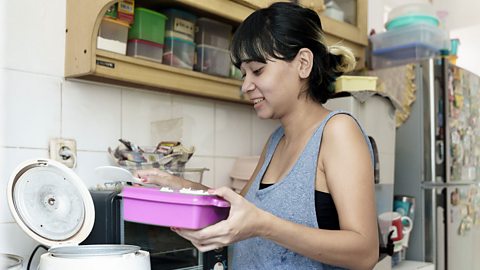Your body goes through a lot of changes in the nine months of pregnancy – from fluctuating hormone levels to gaining extra weight.
And while you’re bound to feel some discomfort, there are ways to soothe, adjust and manage it – we spoke to Grace Ford, a midwife at the Manchester University NHS Foundation Trust, to find out more.
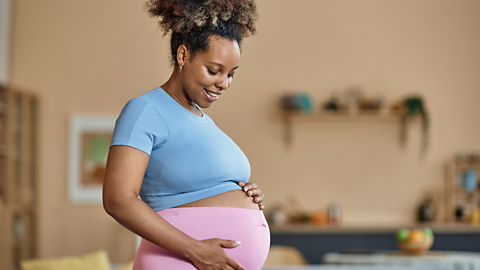
“Lots of things can affect how comfortable you are able to be in pregnancy,” Grace explains.
“This may include how many weeks into your pregnancy you are, how much rest you get, if you are on your feet a lot, or how many babies you are having.”
“There is no ‘right’ way to feel, and everyone is different. You should always speak to your midwife or doctor if you are worried or need help with feeling uncomfortable.”
First trimester – Dealing with tiredness
“It is common to feel tired in the first trimester due to hormone changes, so listen to your body and look after yourself.
“And while there is no ‘quick fix’ to tiredness, there are ways you can listen to your body and look after yourself…
“Try to get as much sleep as you can at night and nap during the day if you need to.
“Eating small meals more frequently not only helps to reduce morning sickness but can also help maintain your energy levels throughout the day.”
“Avoid foods that contain refined sugar as much as possible, as these cause dips in your blood sugar levels, which make you feel tired. It is better to eat complex carbohydrates such as oats, brown rice and wholegrain pastas.
“Food that is high in protein like meat, beans and pulses can make you feel fuller for longer and release energy more slowly throughout the day, helping you feel less tired.
“If you are dehydrated, it can make fatigue worse, so make sure you drink plenty of water throughout the day.
“Some women may be eligible to apply for The Healthy Start Scheme which can support a healthy and nutritious diet in pregnancy and until your child is four years old. This can be applied for from 10 weeks of pregnancy.
How to apply to The Healthy Start Scheme
“Exercise like walking, swimming and pregnancy yoga can help boost your energy levels during the day and make you more tired at night making it easier to get to sleep.”
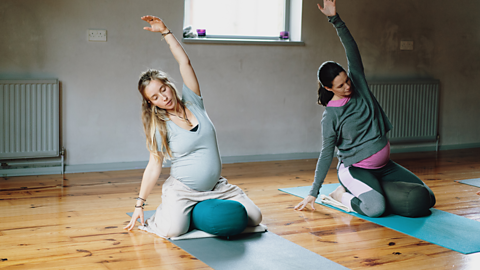
Second trimester - Dealing with aches and pains
“In the second trimester, many mums-to-be feel less tired and sick as their hormones aren’t fluctuating as much.
“However, as the baby grows, some people find it harder to get comfortable. As the womb gets bigger your centre of gravity changes. The skin across your abdomen might feel tight or like it’s stretching.”
“A hormone called ‘relaxin’ is produced during pregnancy, which is at its highest levels in the second trimester.
“Relaxin softens your ligaments so they can stretch more easily to accommodate the growth of your baby and help the labour process. Sometimes, this softening of your ligaments can cause discomfort in your pelvis and lower back. It is very common, but you should tell your midwife or health professional so they can rule out other conditions like urinary tract infections (UTIs).
“To help with the discomfort in your pelvis and lower back, you should avoid sudden movements. Move slowly when standing up to stop ligaments stretching too quickly. You can use your hands to hold your bump when you move to relieve some of the pressure.
“Throughout the day, make sure you take breaks and rest regularly. Being on your feet for a long amount of time can make the discomfort worse.
“You can also try using a hot compress on the area that’s uncomfortable to relax the muscle. Stretching and pregnancy yoga can also help ease discomfort.
“Try to maintain good posture, keep active and use relaxation techniques. If you feel you cannot manage the discomfort yourself, speak to your midwife, who may be able to refer you to a physiotherapist for extra support.”
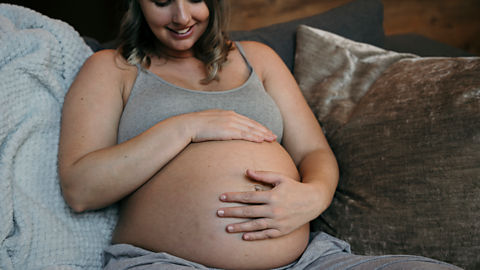
Third trimester – Dealing with tiredness, soreness and itchy bumps
“In the third trimester, you may find pregnancy is more uncomfortable than in the second trimester, as your baby grows. You can feel more pressure in your lower back and pelvis as the weight increases and you may find it harder to get comfortable at night.
“To keep as comfortable as possible, wear breathable, loose and stretchy cotton clothing along with supportive shoes. Shoes with good arch support can make your feet less sore and reduce swelling if you have been standing for a long time.
“If you can, continue to exercise and do stretches to reduce muscle tightness and improve your circulation.
“You know your body and how you feel better than anyone, so make sure you listen to it.”
“If you are feeling tired take breaks and rest often. If your feet are sore frequently, lie down. Your left side is best when resting.
“If the skin across your bump feels tight, it can also sometimes feel itchy. It can be helpful to apply a fragrance-free moisturiser regularly to stop dryness which can make itching worse.
“Hot showers can strip the skin of its natural oils, so make sure the water isn’t too hot. Try not to scratch your skin as it can make it even more itchy and irritated and can lead to an infection.
“Always tell your midwife or doctor if you have itching in pregnancy, so they can rule out any other conditions.”
Getting a good night’s sleep during pregnancy
“It is very common to lose sleep in pregnancy, particularly as the baby grows and you get closer to your due date, you may find it harder to get comfortable enough to ensure a restful night’s sleep.
“There are things you can do to make yourself more comfortable. You can try using a pregnancy pillow, which you can wrap around your legs and arms to get into a more comfortable position.
“From 28 weeks of pregnancy, you should sleep on your side as sleeping on your back can reduce the blood flow to the baby.
“If you move around in your sleep, try putting pillows behind you to stop yourself from rolling over onto your back. Don’t worry if you fall asleep on your side and wake up on your back, just move to your side again when you wake up.
“If you struggle to get off to sleep, try breathing techniques for five or ten minutes before you go to bed. Some people find this helps them to relax and calm down after a busy day, making it easier to fall to sleep.
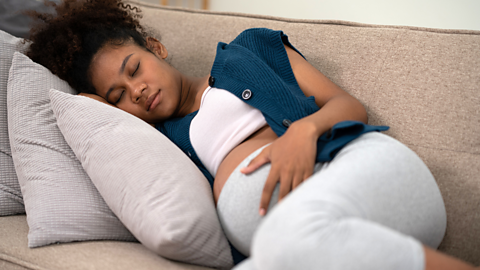
“Doing exercise in the day, such as walking, swimming or yoga can help tire you out, making it easier to fall to sleep at night.
“If you can, try to go to sleep and wake up at the same time every day. This keeps your body in a regular sleep-wake cycle; therefore, you are more likely to fall asleep. This can be difficult to do if you have young children or have a busy lifestyle, so accept help from your friends and family when you can.
“During pregnancy, it is best not to drink too much caffeine. Remember, caffeine is not just in tea, coffee and energy drinks, but also in chocolate and fizzy drinks too.
“If you do consume any caffeine, make sure it is not too close to bedtime as this could keep you awake.
“It is best to avoid big meals before you go to sleep too as this can affect your sleep quality.
“If you can, avoid looking at a screen in the hour before you go to bed. The blue light given off by devices and screens can make it harder to fall asleep.
“Pregnancy can be an exciting but stressful time. If you feel you are struggling to sleep because of your mental health, speak to your GP or midwife as they can make sure you have support in place.”
Medication in pregnancy
“If you have questions about taking medication in pregnancy, you should speak to a health professional.
“Most people can take paracetamol safely in pregnancy, as long as you are not allergic and don’t take it for more than a few days. You should avoid ibuprofen in pregnancy, unless your health professional tells you otherwise.”



